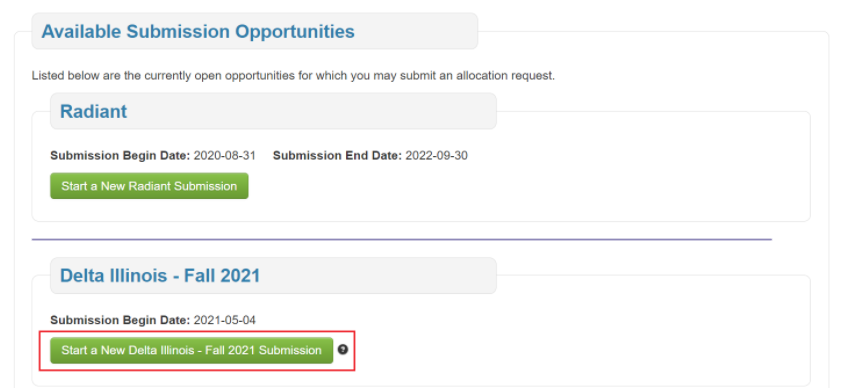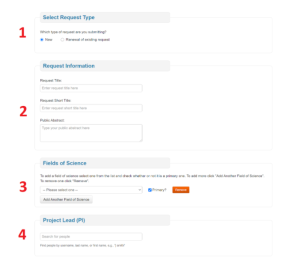Timeline
2021
- June 1 - August 21 - Illinois Allocation requests accepted for Allocations beginning October 1
- June 15 - July 15 - XSEDE Allocations open for Allocations beginning October 1
- September 1 - Friendly user period begins
- September 15 - October 15 - XSEDE Allocations open for Allocations beginning January 1
- October 1 - Delta Production
Submitting your Delta Illinois Proposal
NOTE: Step 1 may take up to 24 hours, please plan accordingly based on the deadline for submission.
- Create an NCSA Kerberos account at this link. Account creation may take up to 24 hours once requested, please plan accordingly.
- Once your NCSA Kerberos account is created, go to the allocation request form:
- Follow this link to go directly to the XRAS submission portal.
- Select "Start a Delta Illinois - Fall 2021 Submission." (See image below)
- Complete your submission
- Select “New” request.
- Add a title and abstract for your submission.
- Select the relevant fields of science.
- One person must be designated as the Principal Investigator (PI) for the request. Other individuals can be added as co-PIs or Users (but they must have NCSA Kerberos accounts).
- Provide the data required by the form. Fields marked with a red asterisk are required to complete a submission. (See images below)
- Enter any supporting agency awards, as applicable.
- Under Available Resources,
- In the Documents section, select "Add Document" and upload any supporting documents.
- Only PDF files can be accepted.
- At the bottom of the page, select "Submit." If necessary, correct any errors and submit the request again.
Policies & Submissions Guideline Recommendations
- Start-up allocations may be requested for test runs and to determine full allocation request needs; up to 1,000 gpu hours, 50,000 core hours
- The maximum allocation will be about 1/10th of the total so ~25k GPU hours and 690k CPU core hours
- Research teams are responsible to manage their own export control needs
- All allocations such as Blue Waters allocations will end with Blue Waters and will not carry over to Delta
- Illinois allocations should be for research only; recommend using XSEDE education allocation process if resources are needed for instruction
- There will be two periodic allocation periods open per year with year-long allocation award opportunities normally occurring April/May and January/February
- Delta will allocate the CPU and GPU resources separately with the emphasis being on the GPU resources with the expectation that most allocations will be primarily a GPU allocation with a smaller supporting CPU allocation.
- The Delta compute elements are more powerful than the Blue Waters compute units with the Delta CPU nodes offering ~6X faster performance and the A100 GPU offering 15X performance improvement. On a performance basis the Delta Illinois allocation offers the same or better performance than 10% of the Blue Waters GPU nodes, but less than 5% of the CPU capability. The smaller storage pool will also limit Delta’s use for the extended storage of large data sets, though the performance of Delta’s flash based storage will provide much faster throughput for some workloads.
- Illinois allocation requests should be significantly different from requests by the same user for discretionary requests or have a strong reason (e.g., proposal opportunity, disaster response, etc.). Discretionary usage should be utilized before an additional Illinois request is made.
- Eligibility: Faculty or staff for whom the University of Illinois at Urbana-Champaign is their home institution by primary appointment affiliation are eligible to submit an Illinois allocation proposal as Principal Investigator. This includes postdoctoral fellows or postdoctoral research associates. Registered graduate or undergraduate students are not eligible to apply as Principal Investigators due to administrative requirements regarding appointment status but are encouraged to apply if their faculty or staff advisor will agree to be Principal Investigator on the proposal. Visiting faculty or external adjunct faculty for whom Illinois is not their primary home institution are eligible to apply as Principal Investigators if, for the period covered by the proposal request: i) Illinois will be their primary (majority) place of residence; and: ii) and they will hold appointments at Illinois during this period. All proposals can include co-PIs and collaborators from other institutions.
- Allocation Definitions:
- Supplements -- Supplement requests can be submitted up until 30 days remain on the current allocation. If a PI has less than 30 days remaining on their allocation but is in need of a supplement, they must typically first submit and be approved for a time extension. When a Startup or Research supplement is submitted, it is automatically assigned for review to the SP(s) requested. After the SPs have completed their reviews, the allocations staff will process (approve or reject) the supplement request and notify the PI through XRAS.
- Extensions -- Extensions are strongly discouraged. If deemed necessary, a time extension can be submitted when less than 90 days remain on the allocation and up to 90 days after the expiration of the allocation. Currently two options are available when requesting a time extension: 3 months or 6 months. This constraint ensures that Research awards remain aligned with future Research opportunities. Once an extension is submitted, an XSEDE Allocations Practices and Procedures Page 27 allocations staff member assigns the extension request to the SP representative(s) responsible for reviewing their resources. The SP enters a review with their decision, and once all sites have agreed on a decision, the allocations staff member processes the extension and notifies the PI through XRAS.
- Final Reports -- guidance TBD; final reports are required for NSF reporting purposes and allocations could be arranged to not be made unless users are in good standing with previous final report submission
Types of Delta Allocations
Delta Allocation Portion | % of System | Description |
NSF via XSEDE | 90% | |
Illinois | 5% | University of Illinois faculty and researchers |
Innovative/Exploratory | 2% | PI's discretion |
Diversity | 1% | EPSCoR, MSI, and HBCUs |
Science Gateways | 1% | For integrating/partnering Delta science gateways (most gateway allocations will go through XSEDE) |
Data Science | 1% | Data Science research projects; could lump in with Illinois as a special category, but may need to open to others |
Delta Allocations Announcement
Delta Illinois Allocation Award requests accepted through August 15, 2021
The National Center for Supercomputing Applications is pleased to announce a University of Illinois at Urbana-Champaign allocation award opportunity on Delta, its new research-computing and data resource. Proposals will be accepted through August 21, with awards announced in September. Any Illinois faculty, staff, or post-doc is eligible to apply. Delta, scheduled to launch in the fall, is a GPU-accelerated system with access to CPU resources and storage; allocation awards will focus primarily on GPU applications but wouldn’t preclude a CPU-only allocation.
Typical allocation awards scale up to 25,000 GPU hours or 690,000 CPU core hours, though start-up awards may be requested for test runs and to determine full-allocation request needs for up to 1,000 GPU hours, 50,000 CPU core hours More information on Delta Policies and Submissions Guidelines and Proposal Submission Instructions can be found on the Delta Illinois webpage: http://www.ncsa.illinois.edu/enabling/delta.
Delta is funded by the National Science Foundation through its Advanced Computing Systems and Services (ACSS) program and will be the most performant GPU computing resource in NSF's portfolio at its launch. Through the terms of the award, NCSA can allocate five percent of the Delta resource directly to Illinois researchers, with most of the remaining time allocated through XSEDE.
If you have any questions, please contact help+delta@ncsa.illinois.edu
_____________
The Delta supercomputer at the National Center for Supercomputing Applications at the University of Illinois at Urbana-Champaign combines next-generation processor architectures and NVIDIA graphics processors to create a powerful computational resource. It will become part of the national cyberinfrastructure ecosystem through the Extreme Science and Engineering Discovery Environment. The Delta Project is partnering with the Science Gateways Community Institute to empower broad communities of researchers to easily access Delta’s advanced computing and data analytics capabilities, and with U of I’s Division of Disability Resources & Educational Services to explore barriers to access. NCSA has provided supercomputing and advanced digital resources for the nation's science enterprise since 1986 and will deploy and operate Delta, funded through NSF OCA 2005572.


